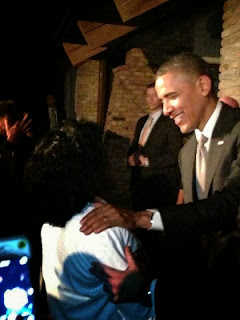 Kudos to U.S. President Barack Obama for graciously meeting and embracing Cuban pro-democracy leaders Berta Soler, of The Ladies in White, and Guillermo Farinas, of the Cuban Patriotic Union (UNPACU).
Kudos to U.S. President Barack Obama for graciously meeting and embracing Cuban pro-democracy leaders Berta Soler, of The Ladies in White, and Guillermo Farinas, of the Cuban Patriotic Union (UNPACU).Both Soler (through The Ladies in White) and Farinas are past recipients, 2005 and 2010 respectively, of the European Parliament's Sakharov Prize for Freedom of Thought.
This simple encounter has sent a message of hope and encouragement to all those risking their lives for freedom and democracy in Cuba.
Unfortunately, in Washington, D.C., this important encounter has been overshadowed by speculation regarding some open-ended remarks by President Obama on U.S. policy toward Cuba.
Here's what the President said, verbatim:
"[W]e’ve started to see changes on the island. Now, I think we all understand that, ultimately, freedom in Cuba will come because of extraordinary activists and the incredible courage of folks like we see here today. But the United States can help. And we have to be creative. And we have to be thoughtful. And we have to continue to update our policies. Keep in mind that when Castro came to power, I was just born. So the notion that the same policies that we put in place in 1961 would somehow still be as effective as they are today in the age of the Internet and Google and world travel doesn't make sense.
And I think that partly because we're of the same generation, we recognize that the aims are always going to be the same. And what we have to do is to continually find new mechanisms and new tools to speak out on behalf of the issues that we care so deeply about."
Fair enough. Here are four simple recommendations:
I. Don't hurt the "extraordinary activists" that you recognize will ultimately achieve freedom in Cuba.
Both Soler and Farinas have made it very clear that the U.S. should not lift sanctions towards Cuba. This would provide the Castro regime with a spigot of economic relief at a time when its Venezuelan subsidies are steadily declining and it's desperately seeking a new foreign bailout for its failed policies.
Moreover, it would provide a pipeline of hard currency to the Castro regime's totalitarian apparatus, as political arrests and repression spike. This would further uneven the playing field for these democracy activists.
As Farinas said about the meeting, "it was an opportunity to express to the U.S. President that there have been cosmetic economic changes in Cuba, that the repression has increased and that he must not let himself be carried away by siren songs."
Last month alone, nearly 1,000 activists were arbitrarily arrested. This increase in repression is perhaps the most dramatic "change" taking place in Cuba today. It should not be rewarded.
II. Focus on updating access to technology.
One aspect of U.S. policy that should continue to be updated in this "age of the Internet and Google" is -- simply -- finding ways to help the Cuban people access the Internet and Google. That is what American development worker, Alan Gross, was doing when he was taken hostage by the Castro regime in December 2009.
Technology has been the key to the growth and strength of Cuba's democracy movement in recent years. The impact of President Bush's 2008 regulations authorizing the non-commercial export of cell phones to Cuba, extended by President Obama, have proven to be transcendental.
The Obama Administration should now launch an initiative to help the Cuban people gain free, uncensored access to the Internet, perhaps through satellite WiFi transmissions -- call it e-Marti.
In the "age of the Internet and Google" this is eminently doable.
III. Ensure current U.S. travelers help the Cuban people, not the Castro regime.
In 2011, the Obama Administration authorized a category of non-degree seeking, educational trips to Cuba, known as "people-to-people" travel. These trips are essentially organized "tourism junkets", whereby travelers stay in the Castro regime's five-star hotels, dine at its restaurants and party at its nightclubs.
Let's stress this important point: 100% of current U.S. "people-to-people" travelers stay in the Cuban military's luxury hotels.
That is absurd.
Why doesn't the Obama Administration require current "people-to-people" travelers stay at "casa particulares," which are private homes that rent rooms to foreigners?
Why not require "people-to-people" travelers to solely dine at "paladares," which are small restaurants run out of private homes (excluding the fancy ones run by the Ministry of the Interior)?
It seems this would be a more "creative" way to help the Cuban people, rather than increasingly feeding the coffers of the Cuban military (which was recently caught violating international sanctions by proliferating weapons to North Korea).
After all, the President's stated purpose for these trips was to help "promote the [Cuban people's] independence from the authorities."
These trips do the exact opposite.
IV. Stop granting visas to human rights violators.
In 2011, the Obama Administration launched a broad initiative to prohibit the issuance of visas to human rights violators throughout the world.
Yet, it seems Cuba has been the exception.
Castro regime officials, including its jailers, torturers and other state security officials keep popping up unexpectedly on the streets of Miami.
Imagine how Cuba's "extraordinary activists" feel seeing the same people that harass, beat and imprison them being rewarded with U.S. visas.
It's incredibly disheartening and sends a message to these human rights violators that there are no consequences for their reprehensible actions.
In other words, it doesn't "help" Cuba's democracy activists, as President Obama acknowledged the U.S. should do.
No hay comentarios:
Publicar un comentario